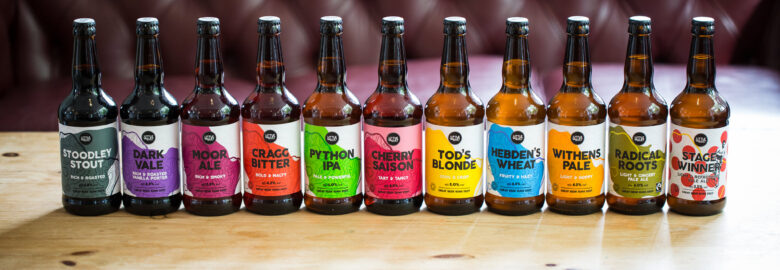Little Valley Brewery
Beer that takes you further
Organic and Vegan Beer
We make vegan beer that takes you further. Look past the scene, go beyond what’s been and focus on what matters – quality, taste and character. Since we set off in 2005, we’ve stayed true to our guiding principles; to make great beer, to enjoy the journey and to share our passion with everyone we meet along the way. Our products are vegan-friendly, organically-sourced and fair trade!
The height of beer craft
We’ve worked our magic since 2005, high up on the Pennine moorland of Cragg Vale, West Yorkshire. But the Little Valley story actually starts before this – back in 1999, high up in the much larger valley of Kathmandu, Nepal.
Great things happen when you mix the right ingredients. Although our vegan beer is made using the finest malts, hops, water, and yeast – it’s our people that’s the most vital ingredient of all. When Wim van der Spek – a qualified master brewer – crossed paths in Nepal with Sue Cooper – a community development practitioner – they discovered that although they were taking different routes, their journeys were very similar.
This was a few days before Christmas. Wim had reached the end of a seven month cycling trip from Holland to Kathmandu. Meanwhile, Sue was to soon cycle home to England after working for two years with an NGO. In the new millennium they would follow a path that would lead to the creation of Little Valley Brewery; considering Wim used to run a beer appreciation club back in his school days, you could say this was fate.
As cyclists and co-owners, Wim and Sue have never been shy to long journeys. They’ve put in the hard graft to produce a diverse range of beers, with styles to suit everyone. Everything has been tried and tested – and tasted – to produce great vegan beers and all but a few, certified organic.
How we Brew
1 sourcing & milling
Firstly, we source our 100% natural ingredients. We crush – or “mill” – the malt, which enables water to enter the malt during the next stage of the process. All our milling is completed at the Maltings.
2 mashing
The malt is mixed with water at a temperature of around 70°C and put into the mash tun. The mash is kept at 64-65°C for 90 minutes. At this point we collect spent grains, which local farmers can use as cattle feed.
3 lautering
The sweet liquid, called wort, is drained off and pumped into our copper, this process is called lautering. The mash is then sprayed with hot water (78°C) to rinse out as much of the sugars as possible.
4 boiling
Once we’ve reached the correct volume of wort in the copper we begin the boil. After 2 hours the bitter hops are added and one hour later come the aroma hops. After 10 more minutes the brew comes off the boil.
later come the aroma hops. After 10 more minutes the brew comes off the boil.
5 clarifying
The whirlpool pump then creates a ‘swirling’ effect within the copper and results in a separation of the hops and ‘heat’ break in the middle of the copper, producing a very clear, clean and hot wort.
6 cooling
Before cooling the wort to 20°C oxygen is injected to prepare a happy environment for our yeast. Cold water enters the heat exchanger at 10°C and leaves at 70°C. The wort is then fed into the fermentation vessel.
7 fermenting
As soon as all of the wort in the vessel has been collected, yeast is added. The temperature then slowly rises to 25°C over the next 4-5 days. The yeast is ‘cropped’ and stored for the next brew. We then chill the fermenting vessel.
8 maturing
Once the beer is cooled to 8°C it’s transferred into our maturation vessels where the sediment drops to the bottom. Over a 7 day period, the beer further ferments and forms carbon dioxide, giving the beer a little fizz.
9 cask filling
We fill our casks directly from the maturation vessels.
10 bottling
Our second fermentation in the bottle produces what’s known as ‘bottle conditioned beer’. This process carbonates the beer naturally.


